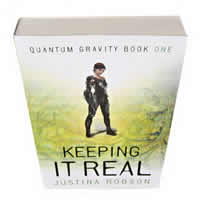Why you can trust GamesRadar+
279 PAGES · £10.99
Author:
Justina Robson
Publisher:
Gollancz
ISBN:
0-575-07862-6
Rating: 4/5
The advance publicity was clear. Justina Robson, we were told, has loosened up and learnt to have fun. Forget Robson the post-cyberpunk author of critically acclaimed literary SF, welcome instead Robson the romp writer. And as a token of this new persona, welcome too a new heroine: sexy, sassy, kick-ass cyborg special agent Lila Black.
Except things are rarely ever quite as straightforward as the marketing department would like, especially when you’re dealing with such an imaginative and innovative author as Robson. Sure, Keeping It Real is fun, but don’t be fooled into thinking it’s not serious fun, the kind of novel where the breakneck pace, oneliners and action set-pieces never entirely obscure deeper themes surrounding identity, sexual politics and the clash of cultures.
Big themes, but here presented in a world built on the most delightfully throwaway idea, the notion of a universe where a “quantum bomb” has ripped down the walls between different realities. Technology and magic now co-exist, and Earth’s inhabitants have had to learn to deal with elves and demons.
All of which would be more than enough in itself for a 21 year-old agent to cope with, but Lila Black has another problem: adjusting to her AI-augmented body, given to her when her flesh-and-blood original was torn apart. How can a girl be sure she’s pretty when she’s largely made of metal? And anyway, who’d want to date someone whose body hides an arsenal powerful enough to take out a small army?
Such angsting is only compounded when Lila is assigned to protect the first elvish rock star, Zal, whose new career hasn’t gone down well with many of his traditionalist compatriotne Soon, as Robson riffs off the familiar idea of charismatic fey folk drawing in humans, Lila finds herself hopelessly attracted to her exotic charge.
Terry Pratchett played with similar meta-stories in Lords and Ladies, but where Pratchett made his elves deep-down bad, Robson imagines them as ambiguous figures. You certainly wouldn’t trust her elves in a business deal, but that doesn’t mean you wouldn’t or shouldn’t invite them round for dinner.
These ambiguities drive much of the narrative. As Zal is threatened with kidnap, Lila is forced to try to work out who she can trust, or thrown into situations where she has to rely on those who may yet turn out to be enemies. Confusing? At times, but you’d guess that’s partly the point, if only because it helps to keep the plot skedaddling along.
In any case, despite her self doubts, Lila is the constant here as Robson introduces a heroine who, for all her bionic parts, is all too painfully human when confronted with her own emotions. As Lila discovers elvish sexuality, genuinely erotic scenes further heighten the sense of intimacy – think less whoput- what-in-what-orifice mechanics and more how sex actually feels.
That’s not to say this is perfect. In particular, there’s too much going on at times as Lila’s augmentations enable her to tackle ever trickier feats. But the advance publicity is in part true: this is by far the most entertaining and, yes, fun book that Robson has written, a novel packed with memorable characters and ideas but that doubles as holiday-reading escapism. No mean balancing act.
Jonathan Wright
SFX Magazine is the world's number one sci-fi, fantasy, and horror magazine published by Future PLC. Established in 1995, SFX Magazine prides itself on writing for its fans, welcoming geeks, collectors, and aficionados into its readership for over 25 years. Covering films, TV shows, books, comics, games, merch, and more, SFX Magazine is published every month. If you love it, chances are we do too and you'll find it in SFX.



